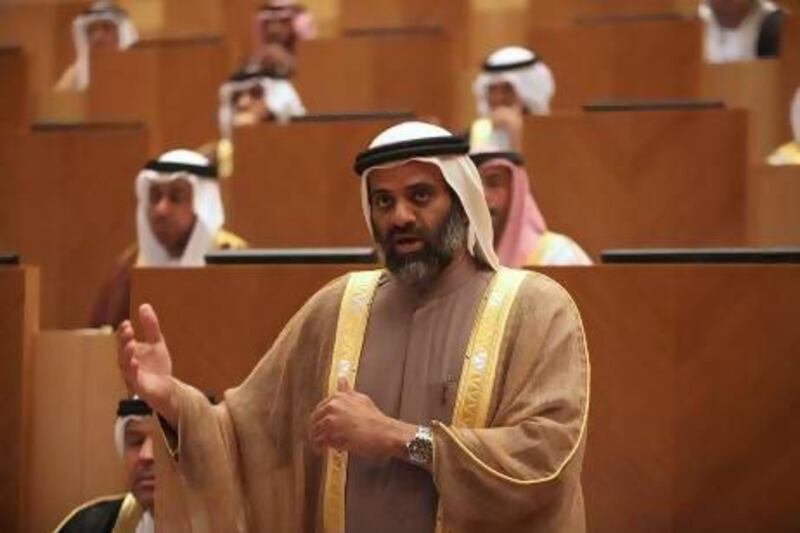ABU DHABI // Frustrated FNC members yesterday called for the council to be given priority in ministers' schedules after two more failed to appear to answer questions.
Dr Hadef Al Dhaheri, the Minister of Justice, and Sultan Al Mansouri, the Minister of Economy, sent apologies for their absence.
Mr Al Mansouri's written response to a question from Hamad Al Rahoumi (Dubai) about the ministry's role in controlling food price rises did not satisfy the member, who asked that the minister be summoned to the next session.
The written response was not made public.
Dr Al Dhaheri was to have been asked by Musabah Al Ketbi (Sharjah) about the failure to set up a dispute resolution panel in Al Dhaid, and by Ahmad Al Zaabi (Sharjah) about a new fee of Dh350 a case for judicial e-services.
Their absence prompted members to discuss whether the council should change the way it draws up its agenda and summons ministers, to reduce the increasing number of no-shows.
Since the summer break, Saqr Ghobash, the Minister of Labour, and Mohammed Al Gargawi, the Minister of Cabinet Affairs, have also failed to attend.
Both provided written responses but the members who asked the questions were not satisfied and summoned them to attend the next session in person.
Members noted that the absence of ministers has delayed discussion of several bills, including a companies law and reports on the ministries of interior, health and economy, and the National Media Council.
They complained that while the dates of FNC sessions are set months in advance, and ministries are often told then that their minister will be asked to appear, agendas are finalised only a few days before each session and do not take into account whether the ministers can attend.
Before the current FNC was elected in 2011 the council set its agenda a fortnight in advance, which Dr Anwar Gargash, the Minister of State for FNC Affairs, said helped ministers to clear their schedules.
Since then, agendas have been published as little as three days in advance, although on a particular date.
Dr Gargash said while this was an improvement "on paper", in practice the old system had worked better.
"In the current system there is a problem," he said. "It is important for the agenda to be clear and ministers to attend. We are ready to sit with the secretary general and agree on a new way."
He defended ministers against suggestions that they were deliberately avoiding coming to sessions, saying that was not the case.
Dr Amal Al Qubaisi (Abu Dhabi) pointed to a lack of co-ordination between the Ministry of FNC Affairs and other ministries.
Dr Gargash said his ministry was not to blame and would continue to do its best to meet the council's requests for ministers to attend.
Mr Al Rahoumi said that with two or three months' notice it should be possible for ministers to plan to attend.
"They should give us priority," he said.






